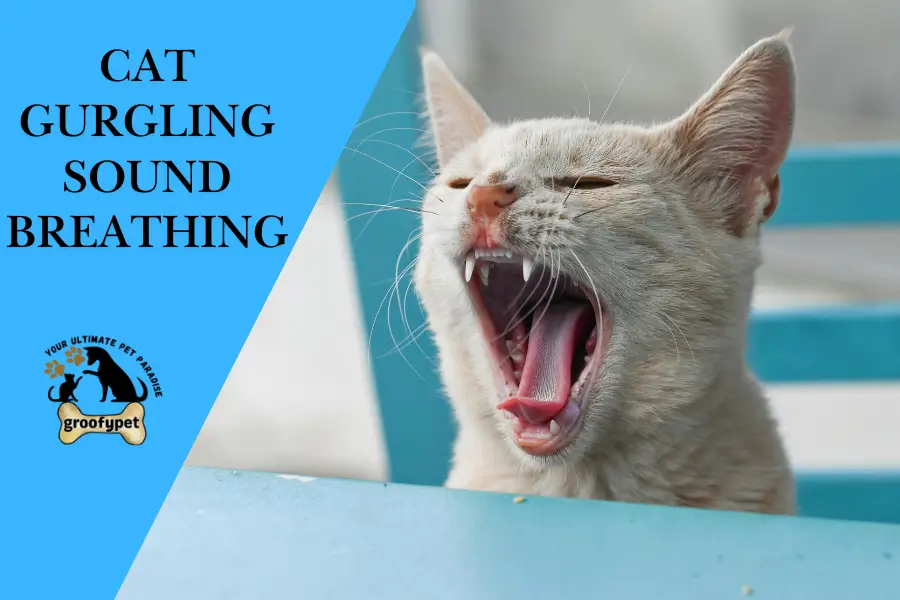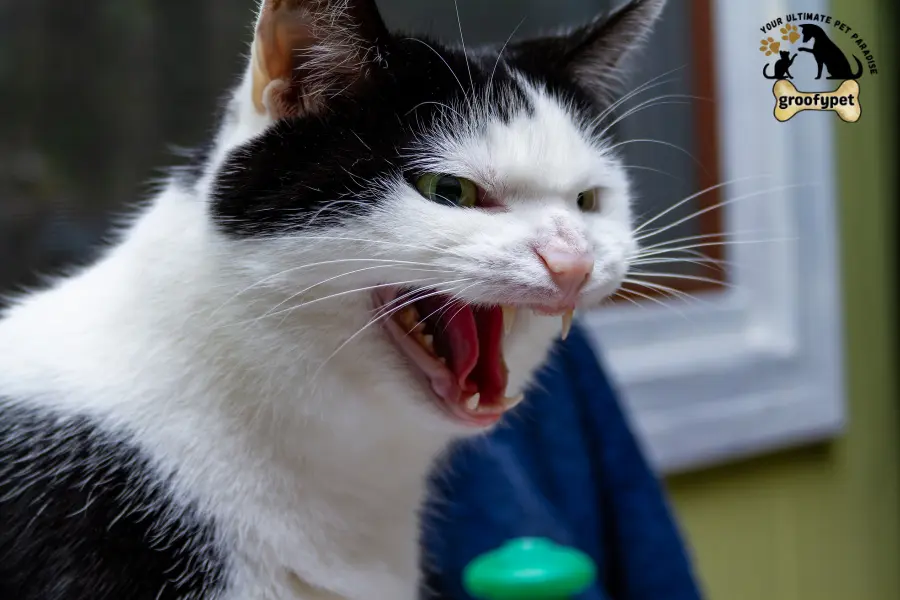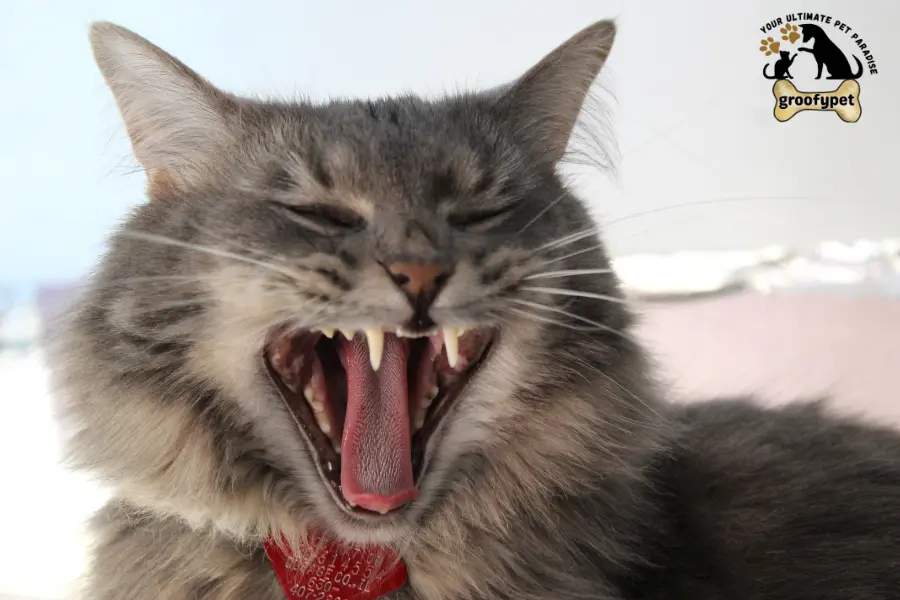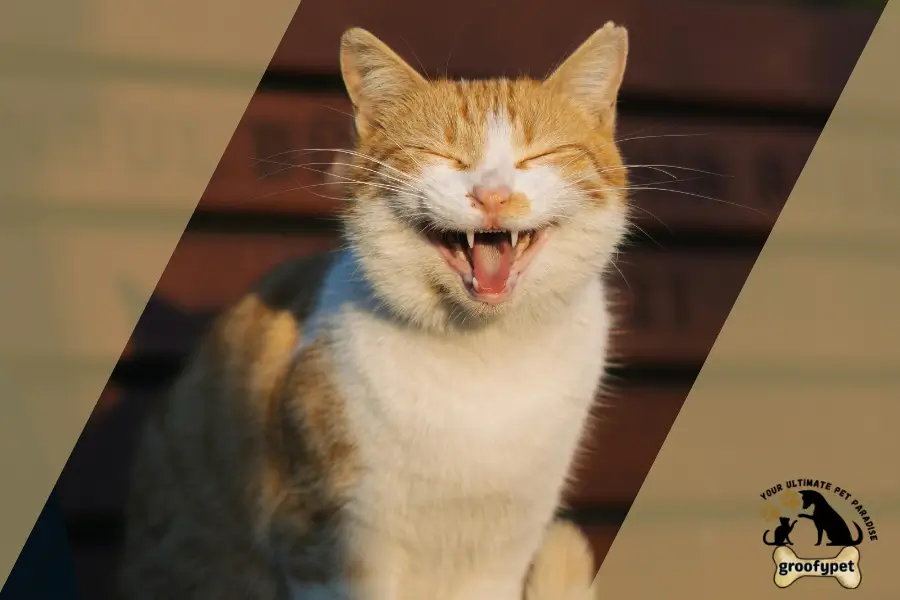
Did you know that a healthy cat usually breathes between 20 to 30 times per minute and makes little to no noise? When you start hearing a cat gurgling sound breathing it means something is not normal. This gurgling or bubbling noise point to mucus, infection or fluid in the lungs. It is a sign that your cat struggling to breathe properly.
Knowing what this sound means helps you act fast and protect your cat health. Sometimes it is harmless but other times it signals a problem in the lungs or throat. Understanding what causes this cat gurgling sound breathing can help you know when to worry and when to see a vet. Hearing your cat make a gurgling sound while breathing can be scary.
You might worry about what is wrong and feel unsure about what to do next. No pet owner wants to see their cat in discomfort or gasping for air. This sound often means something is blocking your cat airway or there is fluid in the lungs. Learning the real reason behind cat gurgling sound breathing help you take the right steps before it becomes serious.
It is a quiet evening and suddenly you hear a strange noise from your cat. It sounds like bubbling or gurgling every time they breathe. You lean closer and realize this cat gurgling sound breathing is not normal. Cats donotusually make such sounds while resting or sleeping.
It might be a small cold or something serious. Understanding this sound is the first step in keeping your furry friend safe and healthy.
Sometimes it’s harmless, but other times it can signal a health issue. Understanding what this sound means helps you care for your cat better. In this guide, we’ll talk about what causes it, how to check your cat, and when to see the vet.
Table of Contents
ToggleWhat does a cat gurgling sound breathing sound like?
A cat gurgling sound breathing can sound like bubbling, rattling, or even a soft choke. It might happen when your cat exhales or inhales. You may hear it more when your cat rests or sleeps. The sound often comes from the throat or chest area.
If your cat’s breathing seems rough or noisy, you should observe closely. You may also notice other signs like fast breathing, open mouth breathing, or wheezing. Paying attention to these sounds helps you figure out how serious the issue may be.
Why might my cat make a gurgling sound when breathing?
When a cat gurgling sound breathing appears it come from different causes. Some are mild and short term while others need a vet. Let us look at the main reasons below. fluid or mucus in the airways If your cat has too much mucus or phlegm, air cannot move easily. This can make a gurgling sound. This happens when your cat has a cold, flu or infection.

The nasal passages and lungs fill with fluid, and air bubbles through them. You might also see your cat sneeze or cough . Cleaning the air in your home and keeping your cat warm help but a vet check is still best. infection in the lungs or throat A respiratory infection is another common reason for cat gurgling sound breathing.
It can affect the trachea, lungs, or nasal area. The infection makes breathing harder causing noise. Other signs include loss of appetite, tiredness or runny nose. Cats catch infections from other pets or dirty surroundings. If the sound lasts for days your vet may give antibiotics or medicine to clear it up. foreign object stuck in throat or nose
Sometimes a small object like grass, hair, or toy part gets stuck in your cat’s throat. This blocks airflow and makes a gurgling sound. You may also see your cat gag, cough, or paw at their mouth. Never try to remove the item yourself unless it’s visible and easy to reach. If you canot see it, go to the vet right away. This is an emergency and can cause choking or breathing distress.
Heart or lung disease
Older cats or overweight cats can develop heart or lung problems. These conditions cause fluid buildup in the lungs, which leads to gurgling sounds when breathing. Cats may breathe with effort, get tired easily, or cough often. The vet can listen to your cat’s chest and use X-rays or ultrasound to find the cause. Proper treatment and low-stress care at home help manage this condition.
Throat or mouth problem
Sometimes, the issue lies in the mouth or throat. Inflammation, tumors, or infections can block airways and create a gurgling sound. You may notice drooling, difficulty swallowing, or bad breath. Early vet checks help find these problems before they get worse. A clean and safe environment reduces the risk of mouth infections in cats.
A cat gurgling sound breathing becomes serious if it happens often or comes with other symptoms. Watch for signs like blue gums, open-mouth breathing, lethargy, or loss of appetite. These signs mean your cat is struggling to breathe.
A healthy cat should breathe quietly, even while sleeping. If the noise lasts more than a day , don’t wait. Go to the vet quickly. Breathing problems can turn dangerous fast especially in kittens or senior cats.
How to check your cat at home for breathing trouble?
- If your cat makes a gurgling sound while breathing, stay calm and observe closely.
- Check how fast your cat breathes.
- Normal breathing for cats is around 20 to 30 breaths per minute when resting.
- Watch the chest for smooth movement.
- If you see your cat using its belly to breathe or if the chest seems tight that is a bad sign.
- You can also look at the gums. Pale or blue gums mean a lack of oxygen.
- Keep your cat calm and away from stress until you reach the vet.
Vet tests and diagnosis for breathing issues
- A vet uses many tests to find the reason behind cat gurgling sound breathing.
- They start by listening to your cat lungs with a stethoscope.
- They may then order X rays, blood tests or ultrasound to check the lungs and heart.
- These tests show if there’s fluid buildup, infection, or damage.
- Sometimes, the vet may do a tracheal wash to check for bacteria.
- Getting a clear diagnosis is important before giving any medicine.
- It ensures your cat gets the right treatment for fast recovery.
Treatments your vet might use
Your vet might use medications, oxygen therapy, or fluid drainage to help your cat breathe better and treat the cause of the gurgling sound.
1. Medications
For infections or inflammation, vets often give antibiotics or anti-inflammatory drugs. These help clear mucus and fight bacteria. If your cat has asthma or allergies, your vet may prescribe inhalers or steroid medicine. Giving medicine as directed helps your cat breathe normally again.
2. Oxygen or hospital care
When a cat gurgling sound breathing becomes severe, oxygen therapy may be needed. Your cat might stay at the vet clinic for a few hours or days. Oxygen helps them breathe comfortably while treatment starts. The vet also monitors heart rate and breathing during recovery.
3. Removing foreign objects
If your cat gurgling sound comes from a blocked throat the vet removes the foreign object carefully. It can be done using special tools under mild anesthesia. This clears the airways and stops the noise. Always keep small items out of your cat reach to prevent this problem.
4. Managing chronic conditions
Some cats have chronic lung or heart disease. In such cases long term care is needed. The vet may recommend a special diet regular checkups and medicine. Keeping your cat stress free and active helps improve breathing. Use clean air filters and avoid smoke or perfumes around your cat.
How to care for your cat at home while they recover?
After treatment your cat needs comfort and care. Keep the room quiet and warm. Offer fresh water and soft food to help them eat easily. Avoid forcing play or handling your cat too much. Use a humidifier to help them breathe better.

Follow your vet medicine schedule strictly. Watch for any new noises, coughing or wheezing. A calm environment helps your cat heal faster and reduces stress on the lungs.
Preventing breathing problems in cats
- To prevent cat gurgling sound breathing, keep your cat environment clean.
- Avoid dust, smoke, strong scents or dirty litter boxes.
- Regular vet checkups find early signs of breathing problems.
- Feed your cat healthy food to build a strong immune system.
- If your cat goes outside, watch for plants or insects that can cause allergies.
- Vaccines also protect cats from respiratory infections.
- Prevention is always easier than treatment.
Special cases: kittens and older cats
Kittens and senior cats have weaker immune systems. They are more likely to develop respiratory problems. A kitten’s gurgling sound breathing may come from infection or congenital defects. Older cats may have heart or lung disease.
Always give them extra care. Keep them warm, feed them soft food, and see a vet at the first sign of breathing noise. Their age makes them more sensitive to breathing trouble.
Myths and facts about breathing sounds in cats
A normal purring sound is soft and steady while cat gurgling sound breathing is rough and uneven. Some believe it is caused by eating fast but breathing noise usually comes from airways not the stomach. Knowing these facts helps you react quickly. Never ignore strange sounds that last more than a day.
Cat gurgling sound breathing after surgery
After surgery, it’s common for a cat gurgling sound breathing to appear for a short time. Anesthesia can make mucus collect in the throat or lungs. Your cat may sound like it’s gurgling, snoring, or wheezing while resting. This should slowly go away as your cat recovers.
Keep your cat warm and calm. Give water and food only when your vet says it’s safe. If the gurgling sound lasts more than a day or your cat seems weak, it may mean fluid buildup or infection. Call your vet right away for a check-up.
Old cat gurgling sound breathing
Older cats often have weaker lungs and heart muscles. This can cause cat gurgling sound breathing more often than in young cats. Age-related issues like heart disease, chronic bronchitis, or fluid in the lungs may create bubbling or rattling noises.
You may also see signs like coughing, tiredness, or slow movement. Keep your senior cat away from dust, smoke, and stress. Regular vet visits help spot problems early. A calm home and a good diet can improve your old cat’s breathing comfort.
Cat gurgling sound in throat when breathing
If you hear a cat gurgling sound in the throat when breathing, it often means there’s mucus or saliva stuck in the airway. This sound may come with swallowing, coughing, or drooling. It can happen after eating or drinking too fast or due to a mild cold.
Sometimes, a foreign object like grass can also get stuck in the throat. Always check your cat’s mouth gently. If the sound continues or your cat seems to choke, go to the vet immediately. It could be a sign of throat infection or swelling.
Cat making gurgling noises when breathing
When a cat makes gurgling noises while breathing, it usually means there’s air moving through fluid in the lungs or airways. The sound may be soft at first but can grow louder if the problem worsens. Causes include respiratory infections, allergies, or asthma in cats.

Some cats may also wheeze or breathe with an open mouth. Clean air, good hydration, and rest help, but if the noise doesn’t stop in 24 hours, your vet should examine your cat.
What does a cat gurgle sound like?
A cat gurgle sound is a wet, bubbling noise that comes from the chest or throat. It’s not the same as purring or snoring. It often sounds like your cat is struggling to clear its throat. Sometimes it happens during both inhale and exhale.
This sound is often linked with mucus, infection, or fluid buildup. If you hear it often, it means your cat breathing is not normal. Always take note of how often it happens and report it to your vet.
Cat gurgling when breathing
A cat gurgling when breathing can come from mild congestion or serious illness. Cats may sound like they are choking or bubbling. Watch for signs like open-mouth breathing, coughing, or restlessness. Gurgling sounds usually come from the chest or throat.
The most common causes are respiratory infections, asthma, heart problems, or nasal blockage. Cleaning your cat’s air space and keeping humidity balanced can help. If symptoms continue, seek a vet’s help fast.
Why is my cat making weird noises when breathing?
If your cat makes weird breathing noises, like gurgling, wheezing, or snorting, it can mean airway irritation. Sometimes allergies, dust, or pollen trigger these sounds. Other times, infections or asthma are to blame.
Cats may also breathe noisily if their nasal passages are swollen or blocked. Check if your cat sneezes often or has nasal discharge. These signs show that the breathing noise needs attention. Your vet can find the cause and suggest the right treatment.
Cat chest sounds rattly
When your cat’s chest sounds rattly, it usually means fluid or mucus has collected inside. This is common in cats with bronchitis or lung infections. You may feel a vibration when you touch your cat’s chest. Breathing may be heavy, and your cat may tire easily.
Rattly breathing often means inflammation or congestion in the lungs. Don’t wait for it to go away on its own. A vet can use an X-ray or stethoscope to check the lungs and give the right medicine.
Cats snoring sound
A cats snoring sound is usually soft and normal during sleep. It happens when the airway relaxes or if the cat sleeps in a funny position. But if the snoring turns into gurgling or raspy breathing, that is not normal. It can mean nasal blockage or infection.
Overweight cats or flat-faced breeds snore more often. Keep your cat’s nose clean and bedding dust-free. If snoring comes with coughing or sneezing, visit your vet for a full check-up.
Why is my cat gurgling?
If you notice your cat gurgling it may mean something is caught in the throat or there is fluid in the lungs. It can also be a sign of respiratory infection or post-nasal drip. Cats gurgle when they try to clear their airways.
Listen carefully to when it happens during sleep, eating or active time. Gurgling while resting or sleeping may point to a health issue. If your cat also shows poor appetite or weakness it is time to see the vet.
Cat gurgly breathing
Cat gurgly breathing often sounds wet and heavy. It can happen when mucus or saliva builds up in the chest or throat. It result from infection, allergies or dental issues. The sound may come and go, but if it stays longer than a day it is time for a vet visit.
Cleaning your cat surroundings using air filters and keeping them hydrated can ease mild congestion. Still any constant gurgling sound needs quick medical attention.
Cat makes gurgling sound breathing
- When your cat makes a gurgling sound while breathing it is a signal to observe closely.
- This noise often points to fluid buildup or airway inflammation.
- It also happen after eating or during rest.
- Always notice if your cat’s breathing looks hard or if they use their belly to breathe
.These are warning signs of respiratory distress. A quick vet check helps identify whether it’s a mild cold or something serious like pneumonia.
Why is my cat making noises when breathing?
A cat making noises while breathing have nasal blockage, infection or asthma. These noises are soft or loud depending on how blocked the airways are. Sneezing, coughing, or nasal discharge often appear too.
Keep your home dust free and avoid scented sprays or smoke. If your cat still makes noises after cleaning the air, the vet should examine the lungs and nose for hidden causes.
Why does my cat make a noise when she breathes?
When your cat makes a noise as she breathes she may have airway inflammation or mucus buildup. It can be caused by respiratory infections, allergies or even stress. Sometimes it’s just a passing cold but it can also mean asthma or lung fluid.
If the noise is constant or your cat looks tired visit the vet. Cats are good at hiding pain so strange breathing sounds are important signs.
Cat gurgling sound breathing while resting
When you notice a cat gurgling sound breathing while resting, it usually means something is wrong with your cat airways or lungs. Resting cats should breathe quietly. A bubbling or rattling sound means air is moving through fluid or mucus in the chest or throat. This come from infection, allergies or asthma.
Sometimes cats make this sound after active or when lying in a position that makes breathing hard. If your cat also shows signs like open mouth breathing, coughing or tiredness it needs medical care. Always keep your cat calm in clean air and away from smoke or dust until you see the vet.
Cat breathing sounds like purring
If your cat breathing sounds like purring it can be confusing because it might seem cute or normal. But not all purring like sounds are true purrs. Sometimes it is a sign of labored breathing or airway blockage. Purring usually happens with a calm, steady rhythm.
However if the sound is rough uneven or comes from the chest it means mucus buildup or lung congestion. Check your cat body language. If your cat looks tense breathes with effort or avoids lying down it may not be purring happily. Visit a vet to rule out respiratory distress or infection.
Cat gurgling sound in throat
A cat gurgling sound in throat happens when fluid or saliva collects in the upper airways. You might hear a bubbling or clicking sound when your cat breathes, swallows or meows. Common causes include post nasal drip, throat infection or irritation.
It also happen after eating or drinking too fast. Sometimes cats get small pieces of food or hair stuck in their throat causing this gurgle.
Watch for drooling, gagging or frequent swallowing. These are signs your cat is uncomfortable. If the sound does not go away within a few hours take your cat to the vet to check for blockage or respiratory illness.
Frequently Asked Questions
Why does my cat make a gurgling sound when sleeping?
It could be due to mucus or a minor throat blockage. If it happens see a vet.
Can allergies cause gurgling breathing in cats?
Yes allergies make airways swell and cause noise when breathing.
Is a gurgling sound in my cat chest normal?
No it means fluid in the lungs or infection. Always check with your vet.
Can stress cause my cat to breathe noisily?
It cause symptoms in cats with asthma.
How long should I wait before taking my cat to the vet?
If the sound lasts more than one day or your cat struggles to breathe go to the vet right away.
Final Thoughts
Hearing a cat gurgling sound breathing can be scary but knowing what it means helps you stay calm. It is often linked to mucus, infection or other airway problems. Always observe your cat’s breathing closely and act fast when you see signs of trouble.
Regular vet visits clean air and a healthy diet can keep your cat safe from breathing issues. Your attention and quick action can make a big difference in your cat life.
Why are Cats Scared of Balloons? Every Pet Owner Must Know!
Why Do Cats Like Butt Scratches? Surprising Reasons!



